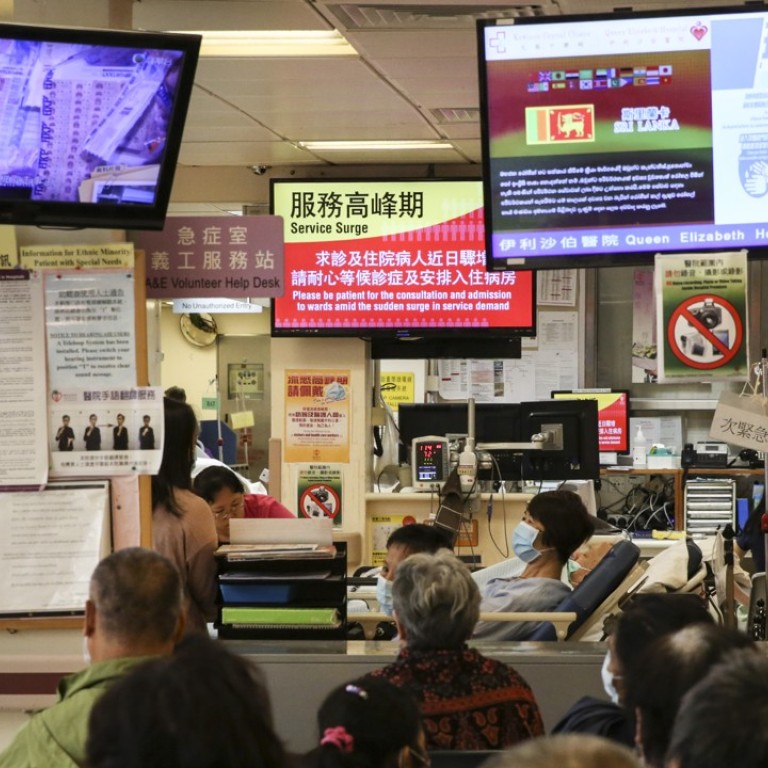
Letters to the Editor, January 11, 2018
Emergency rooms are for urgent cases
Over the Christmas holidays some people had to wait for up to eight hours in emergency rooms in public hospitals in Hong Kong, as the city entered its winter flu season.
Besides the shortage of affordable housing, overcrowding in public hospitals is the most serious problem in the city and waiting times are on the rise as are complaints against the Hospital Authority for failing to deal effectively with this crisis.
There is clearly a shortage of doctors. The Hospital Authority has tried to alleviate the long queues by paying for help from the private sector and some private clinics stayed open during the holidays to ease demand.
While I would like to see the government come up with more effective ways to cut waiting times, citizens can also play their part. As the name suggests, these are accident and emergency rooms. People with minor ailments should not be going there. There are outpatient clinics they can attend.
Also, the government has to increase its cooperation with the private sector, hiring private doctors for shifts and beds in private hospitals. Hopefully then we will see shorter waiting times.
Chow Ka-wing, Kwai Chung
Tougher action needed to curb illegal parking
There seems to be a demand for more car parks but a lot of people don’t bother with them when there is ample free parking and waiting on the double yellow lines.
Take a recent Saturday when I left the Foreign Correspondents Club in Central after lunch, and saw parked and waiting vehicles all along Ice House Street. What we need is not more car parks but fewer cars. Have drop-off and pick-up points, but turn a lot of those double yellow lines red and make stopping illegal.
Many people avoid the car parks for two reasons – they are expensive and they don’t like walking, preferring to wait for an immediate pick-up so cars circulate until the call comes. The Times Square area is notorious for this.
I also see, as I wait for the No 28 green mini bus in Causeway Bay, cars being jockeyed into a space on the double yellow lines where Sun Wui Road joins Leighton Road. There is a kind of drivers’ anarchy where the law is just ignored, so paint those yellow lines in red please.
Norman de Brackinghe, Pok Fu Lam
Neighbours can help stop child abuse
When suspicions are raised about possible abuse of a child, such as the use of corporal punishment, the authorities face problems investigating it because of privacy issues.
This abuse can have tragic consequences, sometimes leading to the death of a child.
I would like to see more community involvement, for example, from neighbours.
People will often be reluctant to intervene if they suspect domestic violence, arguing that it is not their business. But if citizens do suspect abuse they should report it to police.
The fact is that neighbours may be the only individuals who notice there is a problem and they can make a difference, and through their actions ensure something is done to protect an at-risk child.
There is nothing wrong with them calling the police if they fear for the safety of the child.
The government can help to raise awareness by running adverts which point out that corporal punishment is wrong.
This can also help to educate parents who may be tempted to resort to punishing their children in this way. They need to understand that their actions are wrong.
All stakeholders in society have a duty to ensure that all children enjoy protection free from any form of domestic violence.
Teresa Ng, Hang Hau
Subdivided flats could be upgraded
As the prices of flats keep rising and the hope of owning a home seems an impossible dream for many Hongkongers, demand for public housing increases and waiting lists grow.
Many families on low incomes have no choice but to live in subdivided flats and are paying proportionately high rents, eating up much of their meagre income. If these subdivided units must exist, then at least the government could ensure that conditions are better.
It should cooperate with landlords so that the flats are more hygienic and meet all the required standards, including fire safety. The situation will be more bearable if living conditions are better.
Also, extra subsidies should be offered to families who have to live in them to alleviate their economic burdens.
Kylie Wong Po-ki, Kwai Chung
Teens relying too much on their parents
I agree with those who say that many Hong Kong youngsters are not prepared for their future in the working world because of overprotective parents and a spoon-feeding education system.
With parents planning everything for them and rote-learning in the classroom, many local pupils are very passive and reluctant to take the initiative. Compared to their counterparts in other societies they lack the necessary motivation to get involved in self-learning and extracurricular activities that they, not their parents, have chosen.
It is up to these young people to make the necessary changes in their lives. They need to think more for themselves. This can help to enhance self-knowledge and prepare them for the competitive workplace environment they will face as young adults in Hong Kong.
Hopefully, interacting with foreign students who are here on exchange visits will help as they can learn by example. By seeking greater independence they are likely to mature at a faster rate and will find they cope better when they start working.
Jessica Chan, Sha Tin

